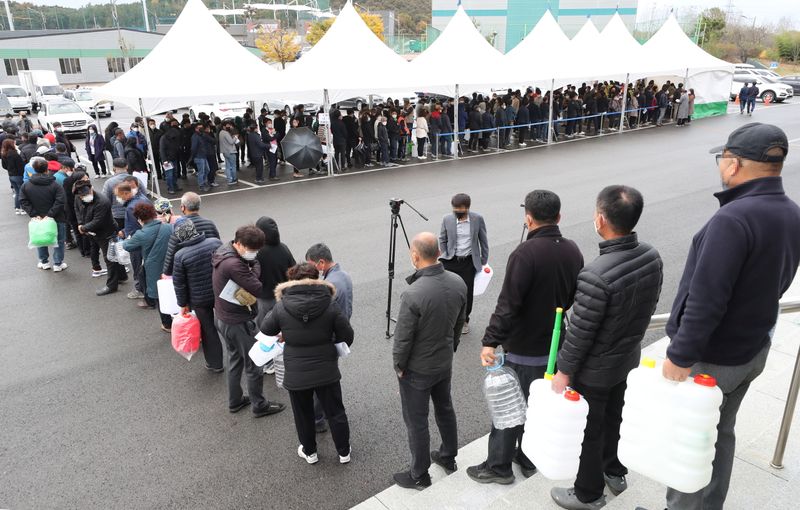By Sangmi Cha and Heekyong Yang
SEOUL (Reuters) - South Korea is flying a military oil tanker to Australia this week to airlift 27,000 litres of urea solution, used in diesel vehicles and factories to cut emissions, amid a dire shortage threatening to stall commercial transport and industries.
Approximately two million diesel vehicles, mostly cargo trucks, are required by government to use the additive, according to industry experts.
Diesel vehicle drivers have started panic buying urea after China's custom's last month introduced a new export requirement, effectively halting exports in order to boost supplies to the domestic market. Nearly 97% of South Korea's urea imports came from China between January and September, trade ministry said.
"I drove about 70 kilometres to a gas station to just get urea solution for my truck and there were long lines of vehicles and my turn didn't come, so I just left empty handed," Lee Byung-ki, 63, told Reuters, adding he would not be able to continue working from Wednesday unless he found some urea.
The shortage is threatening to halt delivery trucks carrying gasoline and other fuels to local gas stations, an official from one of South Korea’s major refiners said.
"If gas stations do not manage to receive sufficient amount of fuel, it could lead to a jump in logistic costs across almost all industries, which eventually could burden consumers (due to) price increases in ordinary consumer goods."
But the shortage could have an even greater impact on South Korea's industrial sector, as environmental regulations stipulate that some manufacturers use urea or face penalties.
The industrial urea inventory, which keeps factories running, was already low, according to a manufacturing industry source.
"What we could do to alleviate the urea shortage for factory operation is to ask the government to relax these environmental regulations," the source said.
Of the 835,000 tonnes of urea imported in 2020, 34.7% was for industrial use, 9.8% for cars and the rest was used to make agricultural fertiliser, the environment ministry said.
A major South Korean urea supplier said it had been unable to import urea from China since mid October, and had slowed production of urea solution as a result.
AUTOMAKERS WORRIED
If the urea shortage persists, the auto sector, which already faces a semiconductor shortage and price hikes in raw materials, would find it difficult to get parts from suppliers, said Lee Hang-koo, an executive adviser at Korea Automotive Technology Institute.
Automakers' factories abroad could be forced to cut production if suppliers were unable to deliver parts to South Korean ports for shipment, he said.
President Moon Jae-in told a cabinet meeting on Tuesday that there was no need for "excessive concern" and help was on the way.
The government has released public sector stocks of urea to areas in urgent need and has said military stocks will also be released as a temporary measure.
Defence Minister Suh Wook on Tuesday said in a parliamentary committee meeting the military plans to release around half the stockpile of 445 tonnes of the automotive urea solutions to civilians as a loan.
South Korea secured 200 tonnes of mass urea from Vietnam this week and is in consultation with other nations for up to 10,000 tonnes, enough to make about 30,000 tonnes of the diesel exhaust fluid. The Defence Ministry on Tuesday said the first batch of supply from Australia had been secured.
In 2015, South Korea made it mandatory for diesel cars to use urea solutions to control emissions, a move that now impacts 40% of registered vehicles. Diesel vehicles made since 2015 were required to be fitted with selective catalytic reduction (SCR) systems which rely on injections of urea solution to scrub nitrogen oxide (NOx) from diesel exhaust fumes.
